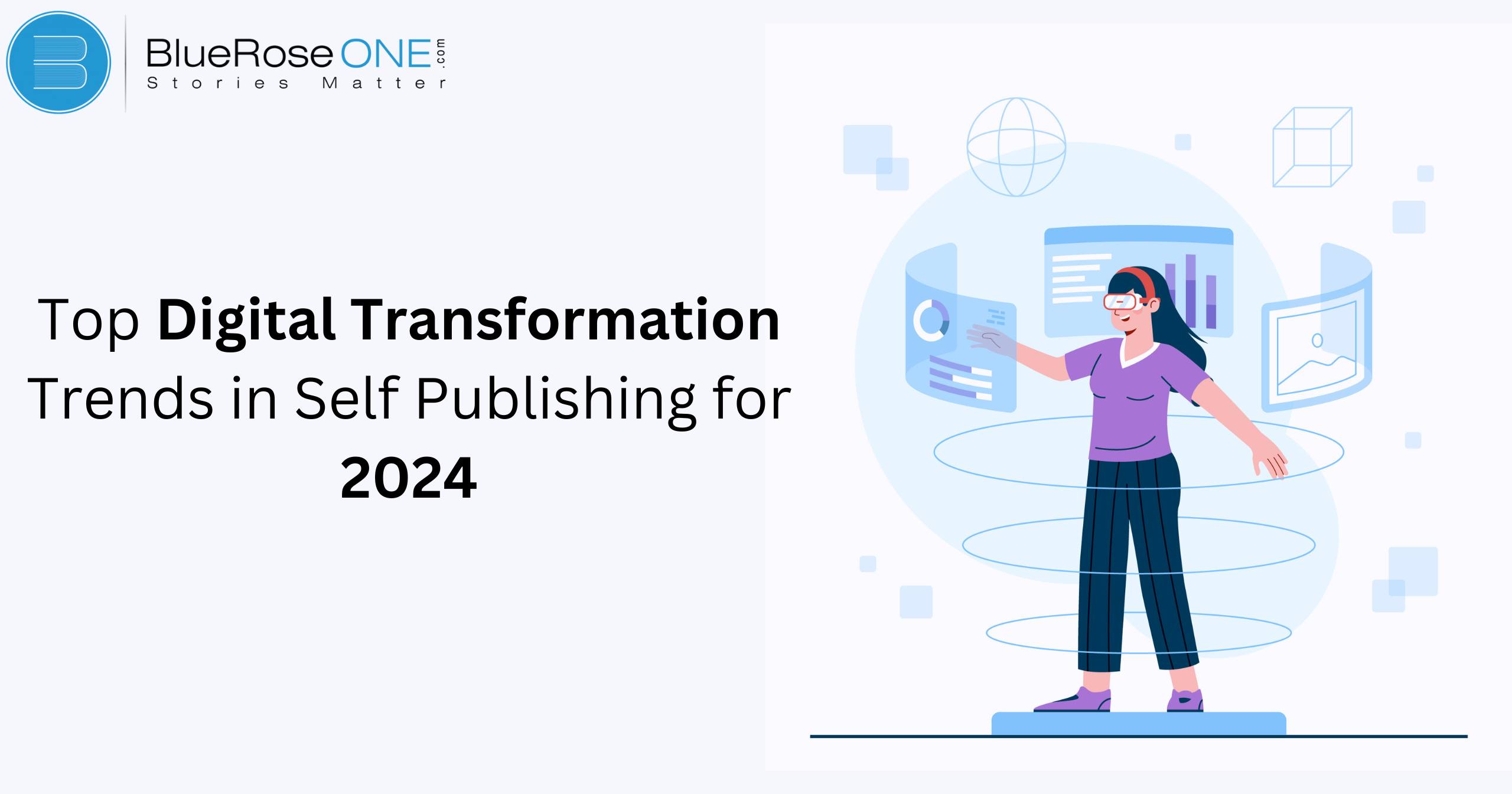Over the last ten years, self-publishing has undergone a significant transformation, and 2025 is expected to be a historic year for this vibrant sector. The digital transformation in self publishing goes beyond simply placing books on the internet; it also involves utilizing state-of-the-art technology to empower authors, improve reader experiences, and expedite the whole publishing process. Let’s examine the main themes that will influence self-publishing in 2025.
The Rise of Digital Transformation in Self-Publishing
Self-publishing has undergone a digital transformation that has improved its accessibility and efficiency beyond measure. With capabilities that were unthinkable just a few years ago, authors may now reach a larger audience and produce more captivating content.
AI and Machine Learning in Self-Publishing
Machine learning (ML) and artificial intelligence (AI) are changing the self-publishing scene. AI-powered solutions may assist with a wide range of tasks, including customized marketing plans and editing and formatting. By analyzing reader behavior, machine learning algorithms can provide authors with insights that will help them write stories that are more engaging.
Blockchain Technology
Ensuring Transparency
Blockchain technology is causing a stir in the publishing sector because it guarantees transaction security and transparency. All transactions are recorded by this decentralised system, which facilitates the tracking of sales and royalties and guarantees that authors are paid on time and without error.
Smart Contracts
Blockchain-powered smart contracts automate royalties and enforce copyright laws. Because the provisions of these contracts are directly put into the code, they are self-executing and guarantee that all parties fulfill their obligations without the need for middlemen.
Enhanced E-Book Formats
Interactive E-Books
With its more engaging reading experience, interactive e-books are growing in popularity. Interactive visuals, embedded movies, and clickable features are changing how readers interact with digital content.
Enhanced Reading Experience
All readers, including those who are visually impaired, will find reading more pleasant and accessible with enhanced e-book formats that include customisable fonts, night modes, and changeable text sizes.
Print-On-Demand Services
Cost Efficiency
In the digital transformation space, cost effectiveness is a crucial advantage, especially for the self-publishing sector. Print-on-demand services are a prime example of this trend because they drastically lower authors’ upfront costs.
Since books are printed just when ordered, unlike traditional publishing, there is no requirement for huge print runs or storage. This reduces waste and financial risk and gives self-publishers more flexibility in how they use their resources.
Authors can concentrate on content production and promotion by utilising digital tools and print-on-demand technologies, which can ultimately improve profitability and flexibility in their publishing journey. By 2025, this trend is expected to completely rethink self-publishing while bringing unheard-of financial advantages.
Customization Options
By offering a plethora of customisation choices, print-on-demand services are revolutionizing self-publishing in 2025 and bringing about a substantial digital transformation in the publishing business. Now, authors may customize the size, format, and cover art of their books to reflect their own vision, providing a level of personalisation that was before unachievable.
This tendency supports the larger movement in publishing towards digital transformation and also improves the visual attractiveness of self-published books. Print-on-demand gives authors more creative control over their work, allowing them to customize each book to fit a particular market and their own style. This redefines the self-publishing environment.
Audiobooks and Voice Technology
Growing Popularity
As speech technology and audiobooks gain in popularity, self-publishing in 2025 will see a major shift in the digital landscape. With more authors realizing that audiobooks may reach larger audiences, it is imperative that cutting-edge voice technology be incorporated.
Self-publishers may now effectively create high-quality audio material and reach a market of readers who prefer to read books on the go thanks to the digital shift.
Advancements in artificial intelligence (AI) voice synthesis and distribution systems are simplifying the process of creating audiobooks for independent writers. This helps them reach a wider audience and optimize their earnings in the self-publishing sector.
AI Narration
The self-publishing industry’s digital transformation is being revolutionized by AI narration. Authors no longer need to use conventional recording facilities to make high-quality audiobooks because of advancements in voice technology.
Independent authors now have more access to audiobooks because of this innovation, which drastically lowers prices and turnaround times. With the growing naturalness and expressiveness of AI-generated voices, self-publishing audiobooks becomes more accessible, allowing more authors to reach a wider readership.
In addition to democratizing the audiobook business, this change improves the reading experience in general and represents a noteworthy development in the digital transformation of self-publishing for 2025.
Self-Publishing Platforms and Marketplaces
Amazon Kindle Direct Publishing
In the self-publishing space, Amazon Kindle Direct Publishing (KDP) is leading the way in digital transformation. KDP, a top self-publishing platform, enables writers to publish their work directly to a worldwide readership while avoiding the obstacles associated with traditional publishing.
The publishing process is streamlined by this digital transformation trend, which provides tools for cover design, marketing, and content preparation. Because of KDP’s extensive market reach and data-driven methodology, authors can monitor sales and reader engagement in real-time.
Through the adoption of KDP, authors can leverage the potential of digital change to attain unparalleled authority and scope in their self-publishing endeavors.
Alternative Platforms
Self-publishing has advanced significantly in the field of digital transformation, providing authors with venues that differ from traditional publishing.
These services, which include IngramSpark, BlueRose Publishers, and Amazon Kindle Direct Publishing, enable writers to easily publish and distribute their work worldwide. With more control over the creative process and royalty distribution made possible by the digital transformation, self-publishing is becoming a more alluring choice.
Authors can make sure their work reaches a wider audience by utilising marketing tools, better analytics, and larger distribution networks. Self-publishing is becoming more and more popular in 2025, thanks to these cutting-edge instruments for digital transformation.
Sustainability in Self-Publishing
Eco-Friendly Printing Options
Eco-friendly printing choices are revolutionising self-publishing in the age of digital transformation. Nowadays, authors use environmentally friendly techniques like print-on-demand (POD), which cuts waste by producing only the number of copies required.
The environmental impact of digital printing technology is reduced by the use of recycled paper and eco-friendly inks. Furthermore, self-publishing sites promote the use of digital formats like audiobooks and eBooks, which drastically reduces the amount of paper used.
Eco-friendly choices are essential to the digital revolution of the self-publishing sector because they not only help environmental conservation but also align with the growing consumer desire for sustainability.
Digital-Only Releases
Digital-only releases are completely changing the self-publishing scene and perfectly complementing the larger objectives of the digital transformation.
These releases greatly lessen the environmental effect of traditional book publishing by doing away with the requirement for tangible materials. Authors who self-publish are embracing this change since they can instantly reach a global audience through digital platforms, which also save money.
The trend towards environmentally responsible publication is growing as more authors and readers come to understand the advantages of sustainability. Self-publishing’s digital revolution is not only a fad; rather, it’s an essential step towards the literary world’s more sustainable future.
Conclusion
In 2025, self-publishing trends driven by digital transformation will enable authors to reach a new level of empowerment. These technologies, which range from blockchain and artificial intelligence to improved e-book formats and sustainable practices, are creating new avenues for participation, efficiency, and creativity.
Accepting these trends will assist you in navigating the changing self-publishing scene and expanding your readership in novel and exciting ways, regardless of your experience level as an author.















